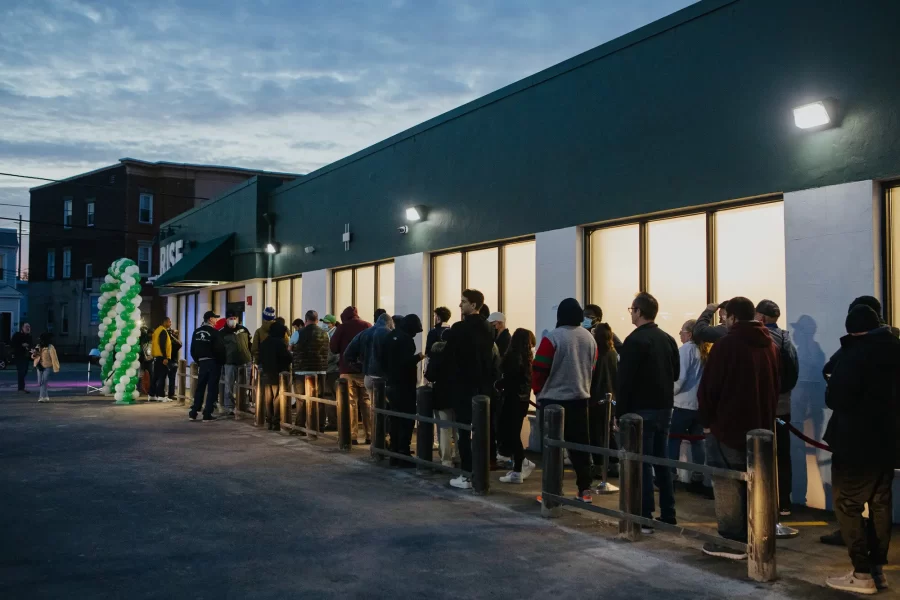New Jersey Legalizes Marijuana: Villanova Community Reacts
April 27, 2022
If a person has ever overheard passionate debates about the existence of Central Jersey while eating dinner at a dining hall, or whether a certain spiced roll of pork should be called a pork roll or Taylor Ham while studying at the library, they are already more than aware of the significant portion of Villanova students originally from New Jersey.
Back in November 2020, New Jersey’s election ballot referendum asked a far more significant question of New Jersey residents: were they in favor of legalizing the possession and recreational use of marijuna? In fact, they were – overwhelmingly, as 67% of question respondents voted in support of the referendum. An amendment to New Jersey’s state constitution legalizing marijuna was added on January 1, 2021, and Gov. Phil Murphy signed it into law on February 22, 2021.
Under the new laws, customers aged 21 or older can buy up to an ounce of marijuna for smoking, or up to five grams of concentrates or oils, or 10 packages of 100 million of edible items. Although the laws were passed last year, creating industry regulations and licensing stores to sell marijuna was a months-long process. As a result, April 21, 2022 was the first day that New Jersey’s 13 officially licensed recreational marijuna dispensaries opened for sale to the public. These 13 dispensaries were originally medical marijuna dispensaries, and, although a number of smaller marijuna growers have received state licenses, they have yet to set up shops.
New Jersey residents have long called for the legalization of marijuna in the state, citing its potential to address issues of systemic racism. Marijuna arrests disproportionately affect people of color. This has been especially concerning in New Jersey, where 34,500 people were arrested for cannabis offenses in 2017, which was more than any other state in the nation.
Ashley Petersen, a junior Chemistry major from Chatham, New Jersey, is one such proponent.
“Fatalities are nearly impossible from marijuana overuse, unless you are a child, making marijuana one of the safest medicinal drugs on the market,” Petersen said. “In fact, marijuana use could potentially save millions of lives, by using it as a substitute for opioid painkillers, which are highly addictive and fatal during overdose. Furthermore, marijuana arrests primarily target Black Americans, leading to high rates of incarceration based on the possession or use of tiny amounts of marijuana.”
Proponents of legalization also cited the potential tax revenue it would bring in. A 2016 report by New Jersey United for Marijuana Reform and New Jersey Policy Perspective, issued in 2016, estimated that the legalization of marijuna would result in an additional annual sales tax revenue of $300 million. Gov. Murphy recently estimated slightly more conservative, but still impressive, figures of $30 million in tax revenue for the 2022 fiscal year and $121 million for 2023.
Rob Cuff, a sophomore Political Science major from Southern New Jersey, voted in favor of the referendum in 2020.
“I think getting rid of marijuana possession arrests, in addition to the monetary gains, benefits the state, both politically and economically,” Cuff said.
However, some New Jersey residents have opposed or raised issues with the legalization. Opponents question the message marijuna’s legalization sends to children and express concern about people driving under the influence.
Cuff also expressed concern over this.
“There’s still no quick and easy way to test if someone is driving while high, but I hope that technology is developed quicker especially now that more states are legalizing weed,” he said.
Others raise concern about how an increased demand for recreational marijuina at dispensaries may affect the ability of medical users to get marijuina.
“As for NJ legalizing weed specifically, I am glad that this bill passed, but I do not think that NJ is adequately prepared for the massive amount of people who will be purchasing from medical dispensaries turned commercial,” Petersen said. “As a medical marijuana patient myself, I am terrified to think about losing my ability to purchase my medication because thousands of people want their fix of marijuana.”
Despite concerns, Cuff thinks that New Jersey’s legalization of marijuna has more benefits than drawbacks. He also believes in its ability to serve as precedent, explaining his hope that “this also prompts Pennsylvania and the Federal Government to change their laws.”
Dr. McCorkel, a Sociology and Criminology Professor, also expressed her belief in the importance of New Jersey’s legalization of marijuna.
“The decision of voters in New Jersey to legalize marijuana is important for several reasons,” McCorkel said. “Most notably it suggests that the public is no longer willing to foot the bill for costly, unjust, and counterproductive Drug War policies.”



